AMD Ryzen 7 1800X CPU Review
Why you can trust Tom's Hardware
Ashes of the Singularity & Battlefield 4
A Note On Testing
As mentioned, we encountered lower-than-expected results in many of our game benchmarks. Concerned that the explanation could be related to Windows' handling of P-states, we ran tests on Ryzen under the High Performance and Balanced power profiles as a diagnostic measure. The former is denoted with an HP in our charts. Intel's chips are tested using Windows' Balanced profile, representing the way most of us configure our desktops.
The Zen architecture is AMD's first with simultaneous multi-threading, so we also tested the Ryzen 7 1800X with SMT disabled to flesh out any performance deltas attributable to this feature. Indeed, we observed higher performance with SMT turned off in some titles.
Finally, we normalized the clock rates of our test samples to compare per-clock performance. Game engines and DX11 do not always scale linearly, so our 3.8 GHz numbers merely serve as a reference.
In light of the unexpected results we do present, we have to warn you that some of our data could be attributable to factors like motherboard firmware or early microcode. Then again, these are products AMD and its partners are selling, so that's a risk early adopters assume. In the meantime, we continue running tests and asking questions. Expect a follow-up soon.
Ashes of the Singularity
Ashes of the Singularity scales well with additional cores and frequency. This rewards the Core i7-6900K and its broadside of eight cores and 16 threads.
Surprisingly, Ryzen 7 1800X does not reap the same benefits. We expected much higher performance in this CPU-intensive title from the 1800X due to its similar core configuration and higher clock rates. In the end, Core i7-6900K outperforms the stock Ryzen setup, despite AMD's seemingly favorable specs.
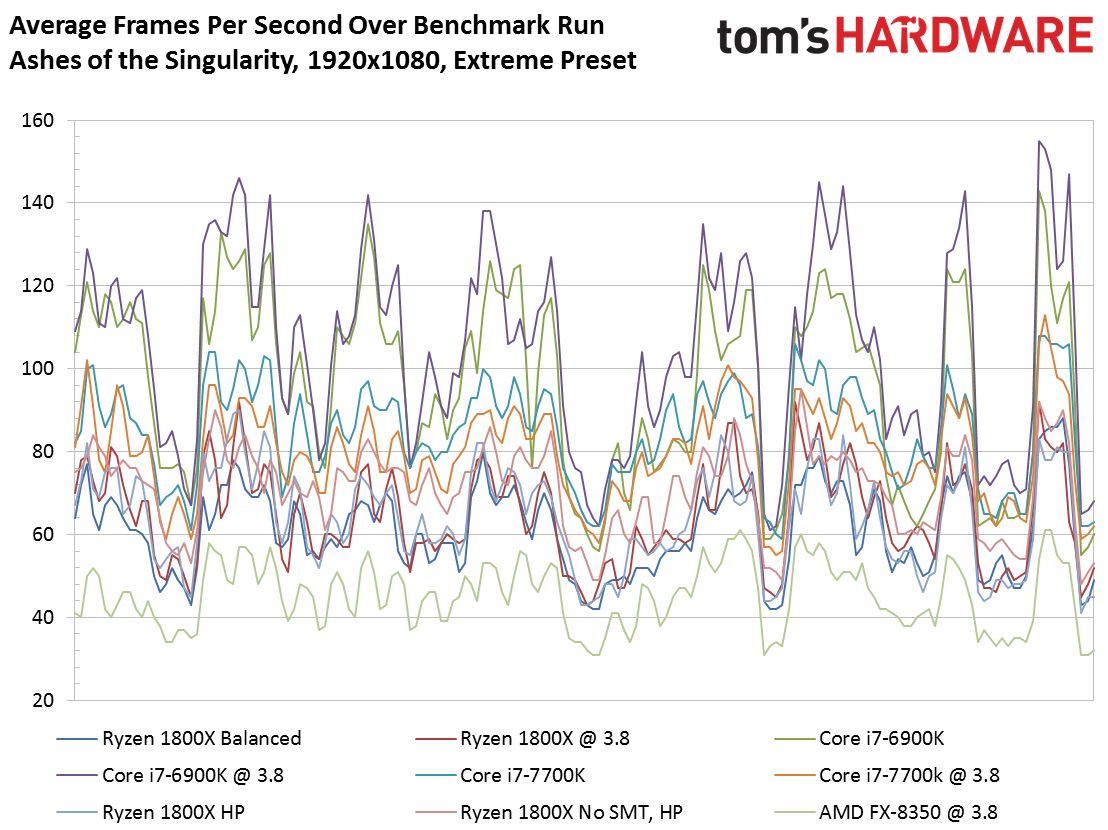
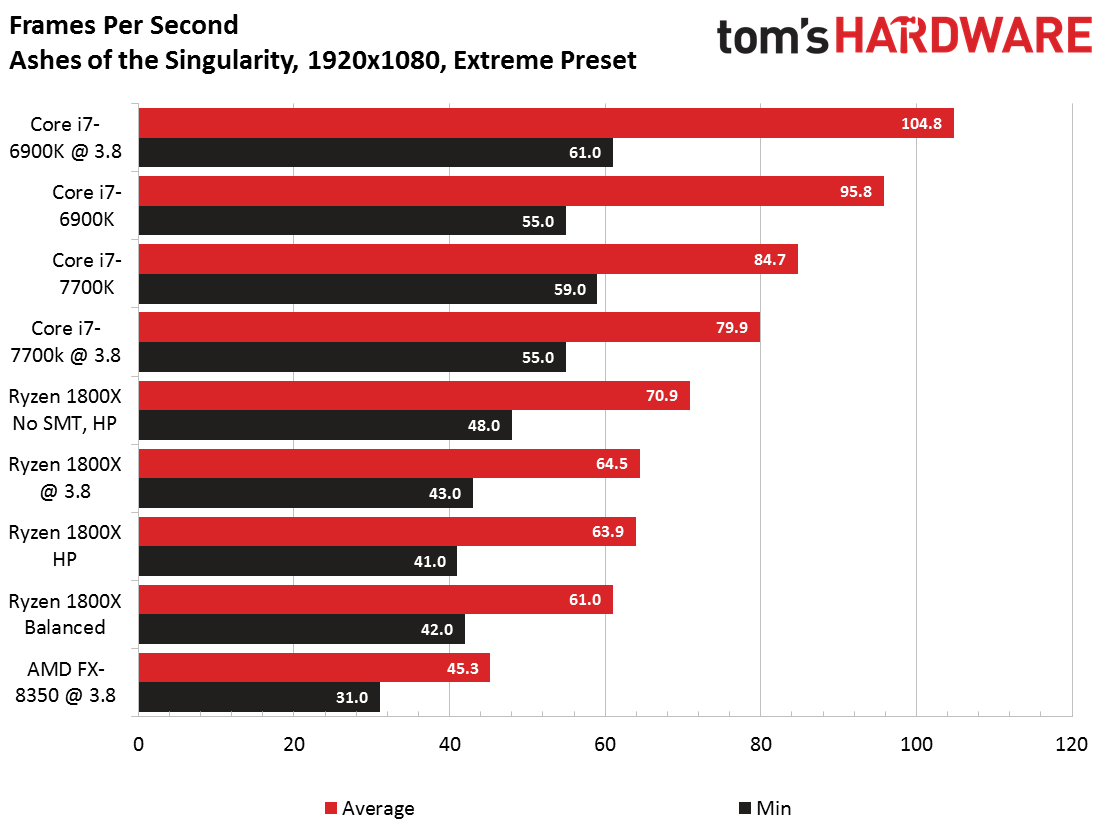
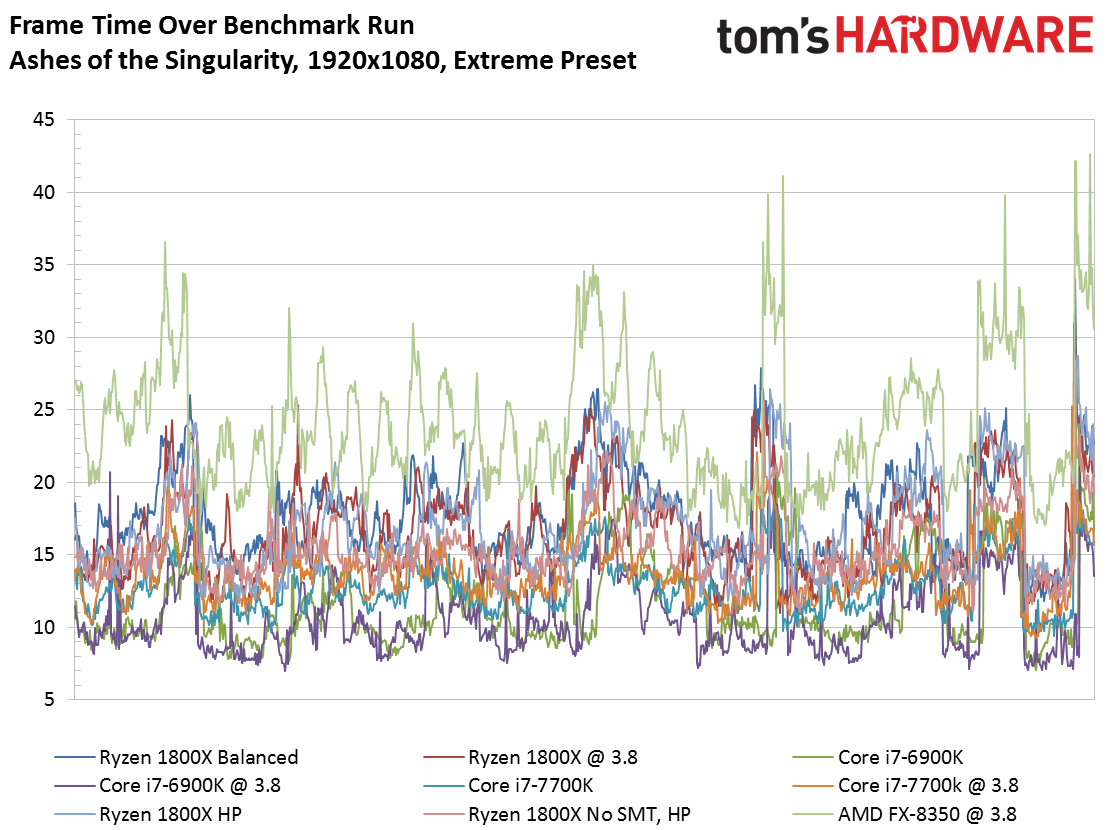
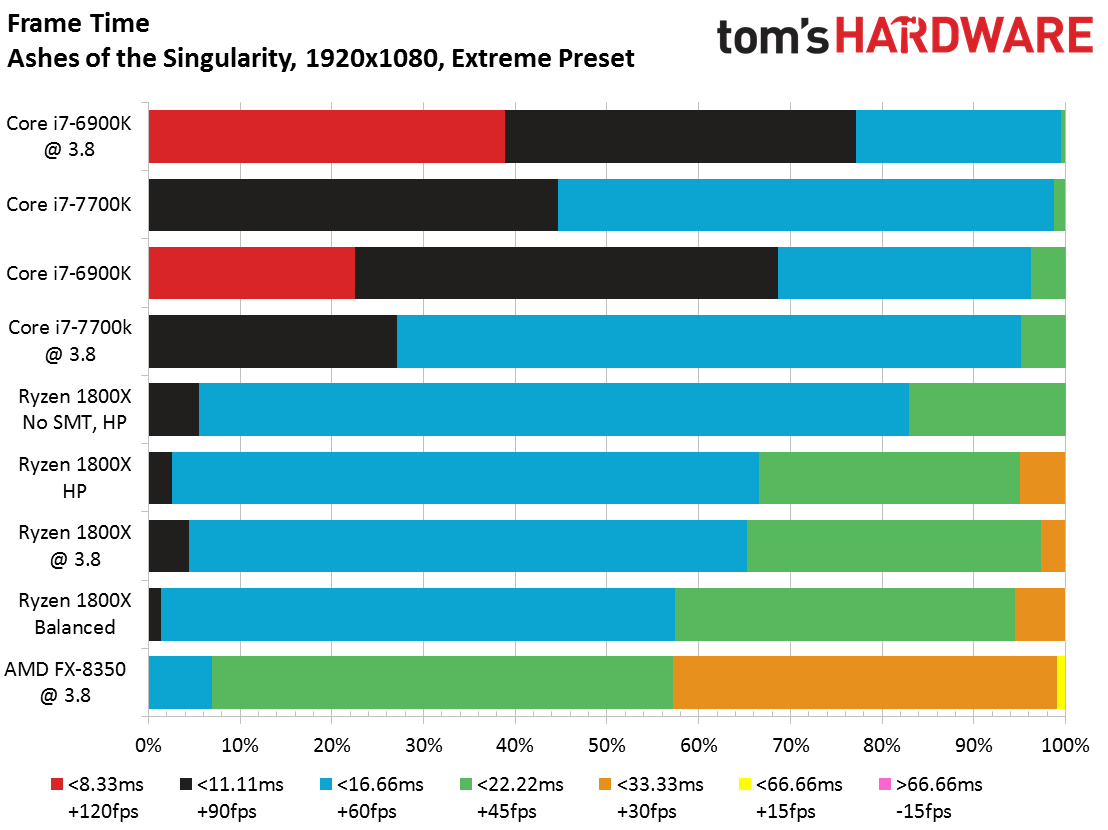
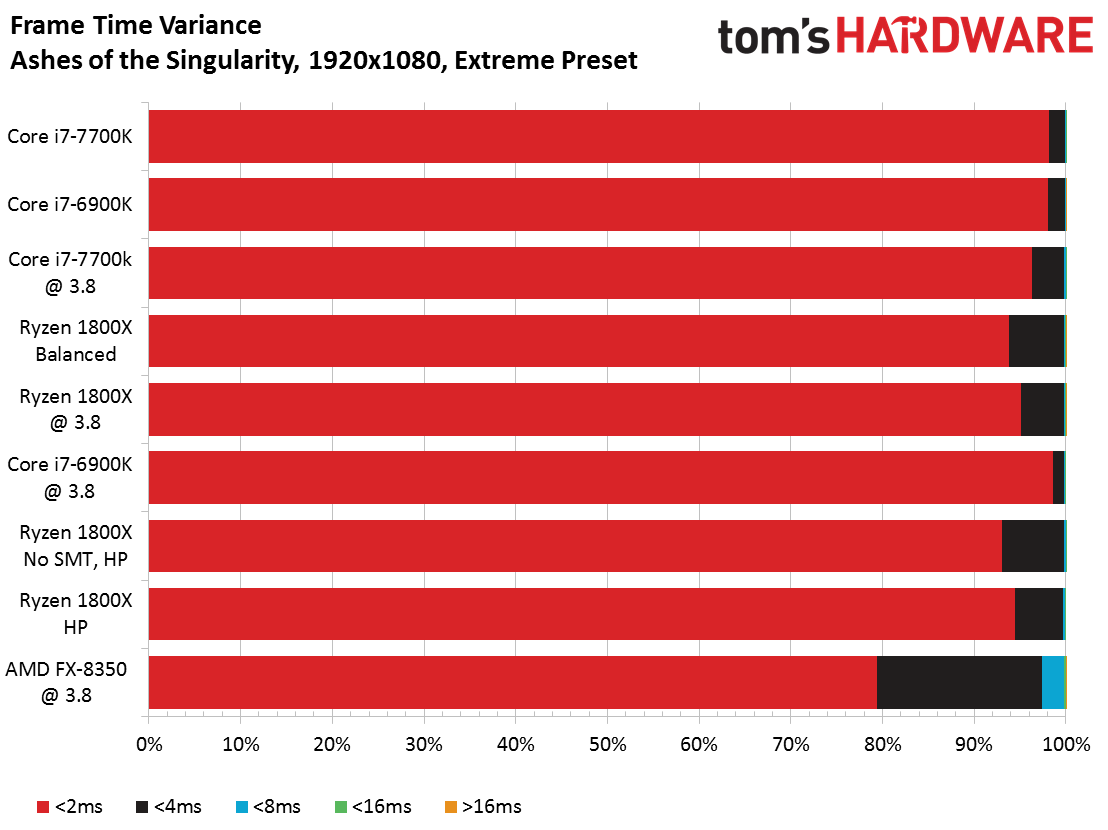
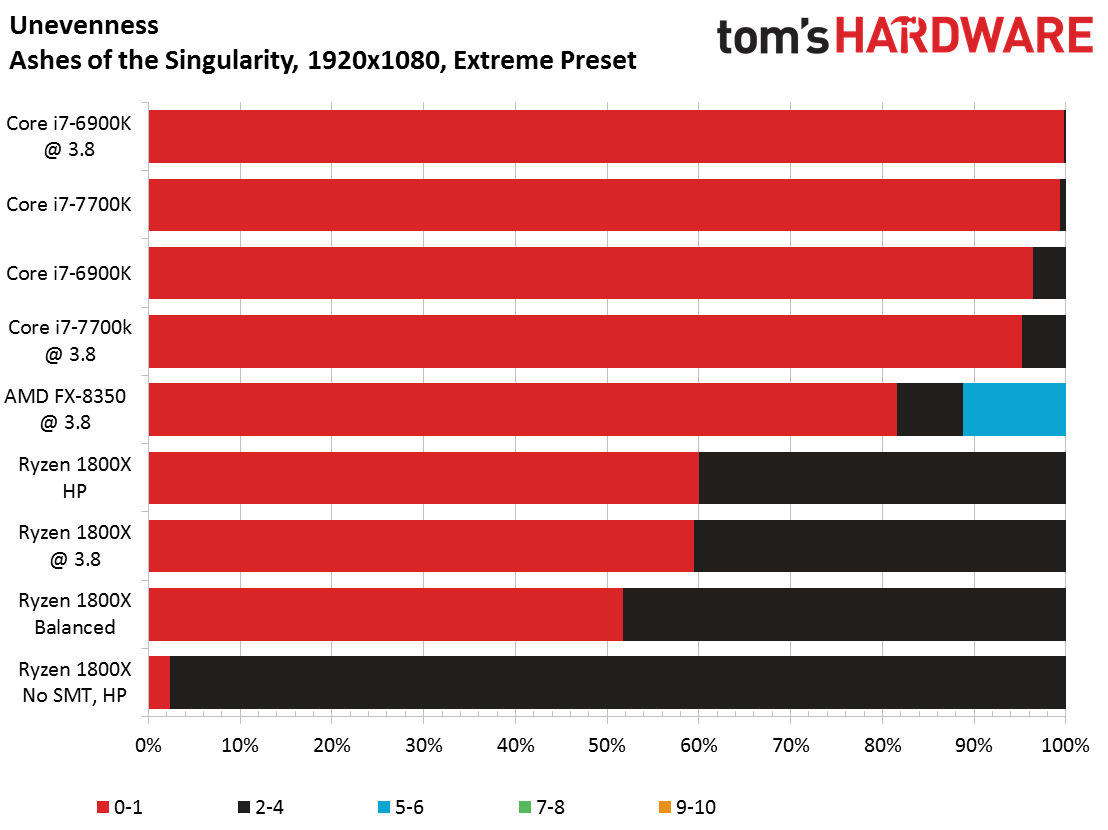
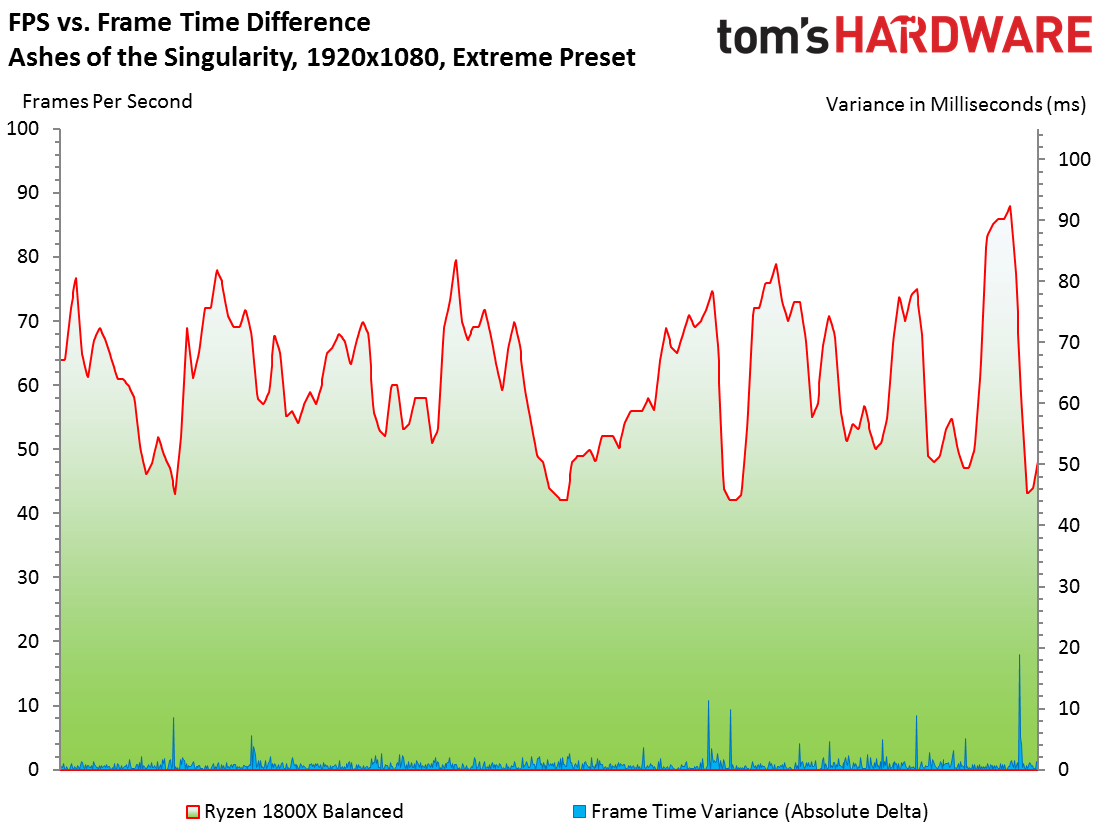
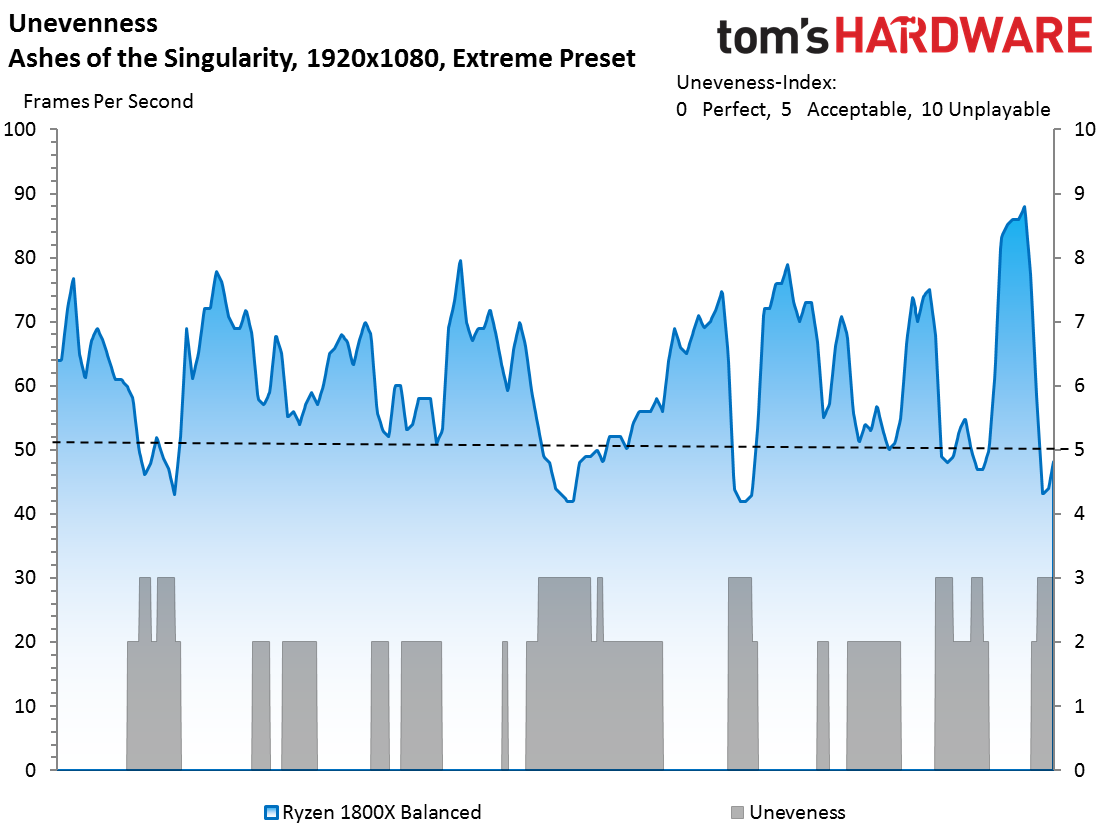
We disabled the 1800X's SMT feature and its average frame rate increased to 70.9 FPS. By comparison, we disabled Hyper-Threading (Intel's equivalent technology) and re-tested the -6900K, yielding a 7 FPS performance loss.
Get Tom's Hardware's best news and in-depth reviews, straight to your inbox.
Surprisingly, even the 4C/8T Core i7-7700K outpaced AMD's Ryzen 7 1800X by a significant margin (and that was after trying to provide the 1800X with the most favorable settings possible). We also noted minimal uplift from overclocking the 1800X to an all-core 3.8 GHz. Due to the automatic XFR function, and the fact that we couldn't disable XFR without losing all Precision Boost capabilities, we couldn't test at AMD's base 3.6 GHz.
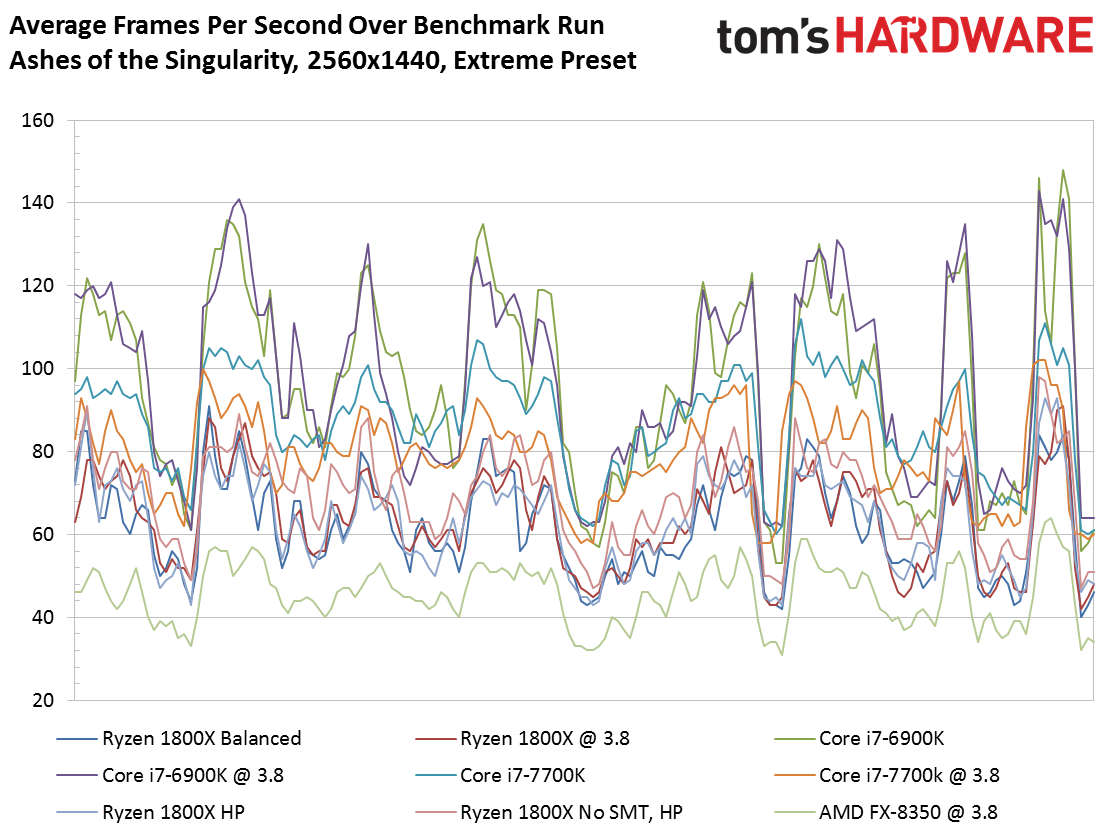
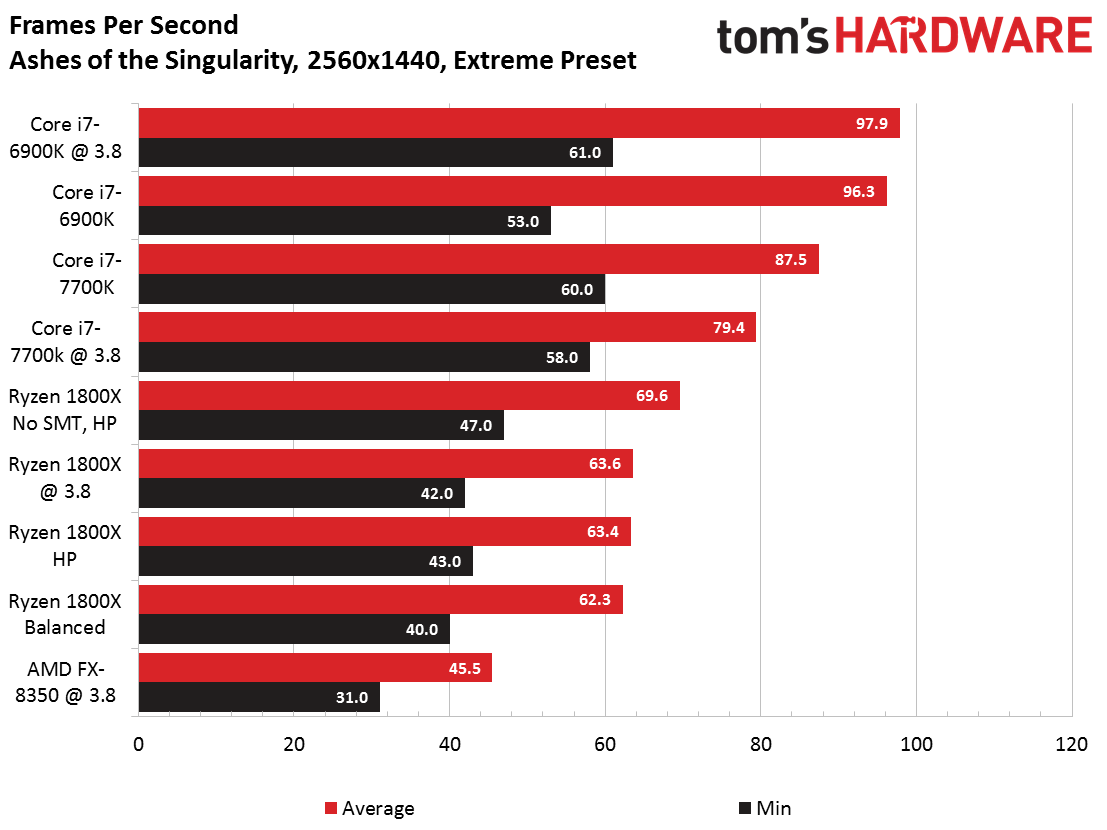
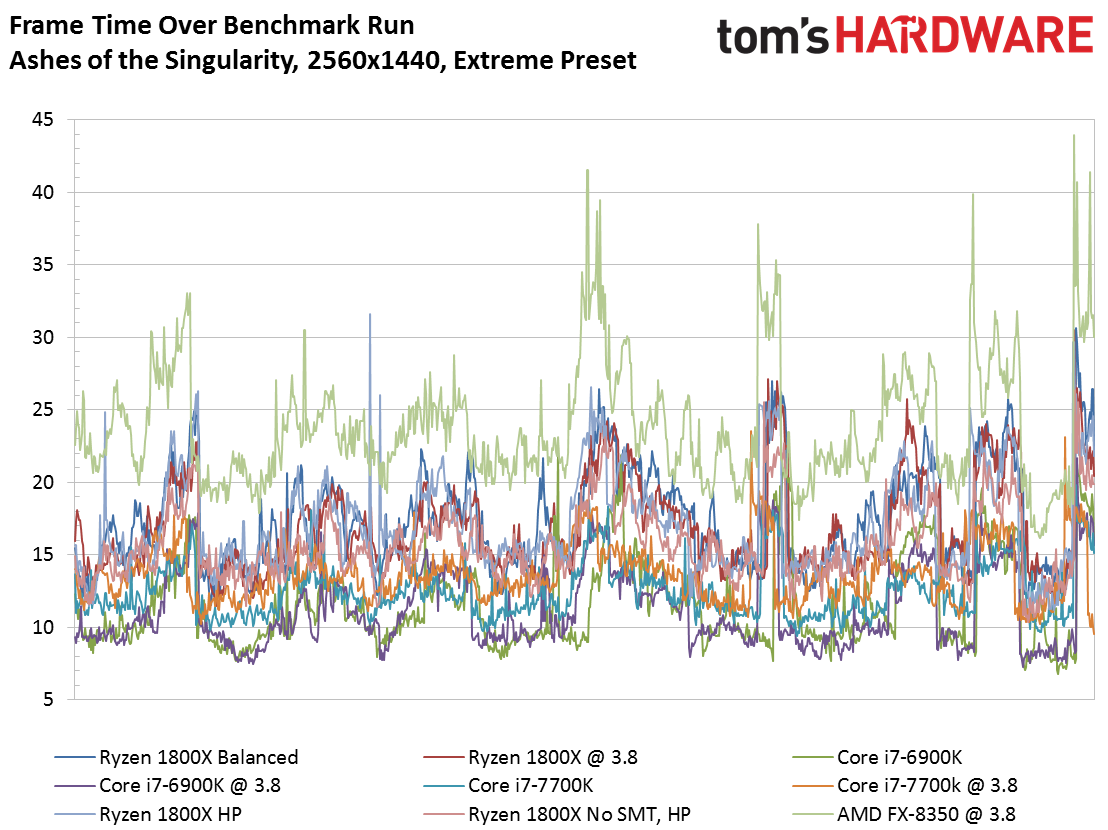
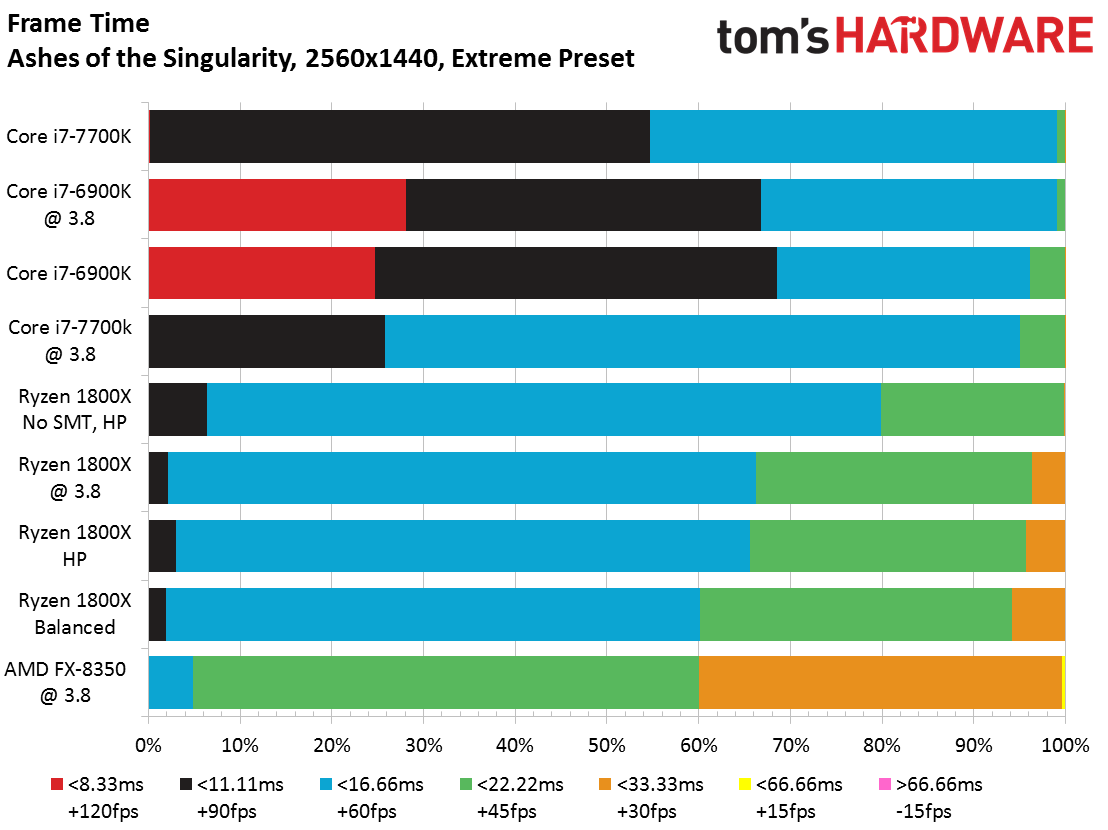
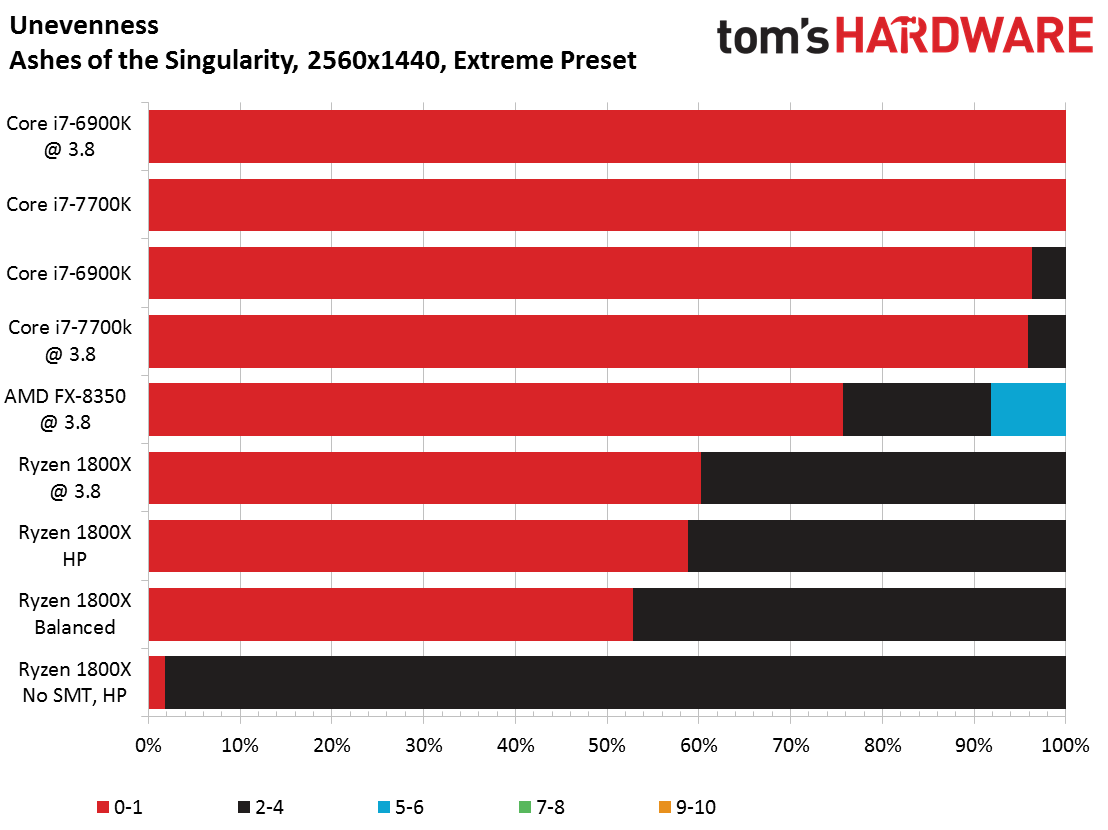
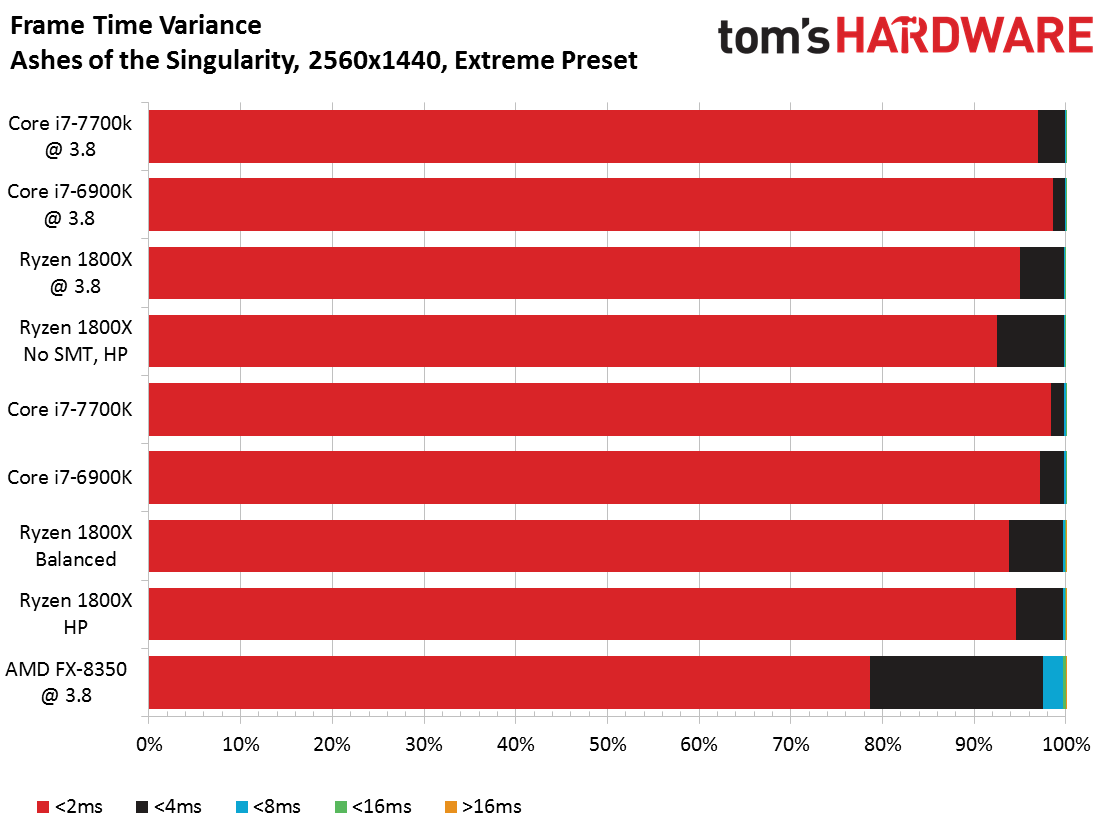
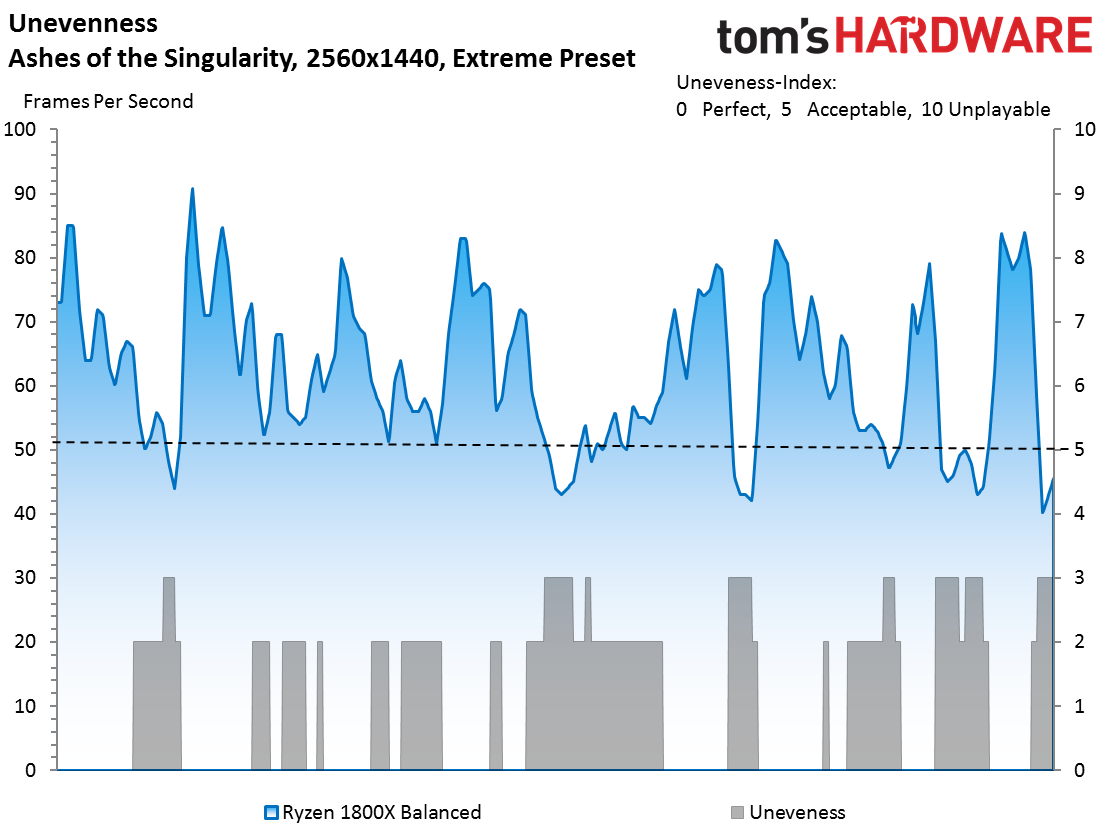
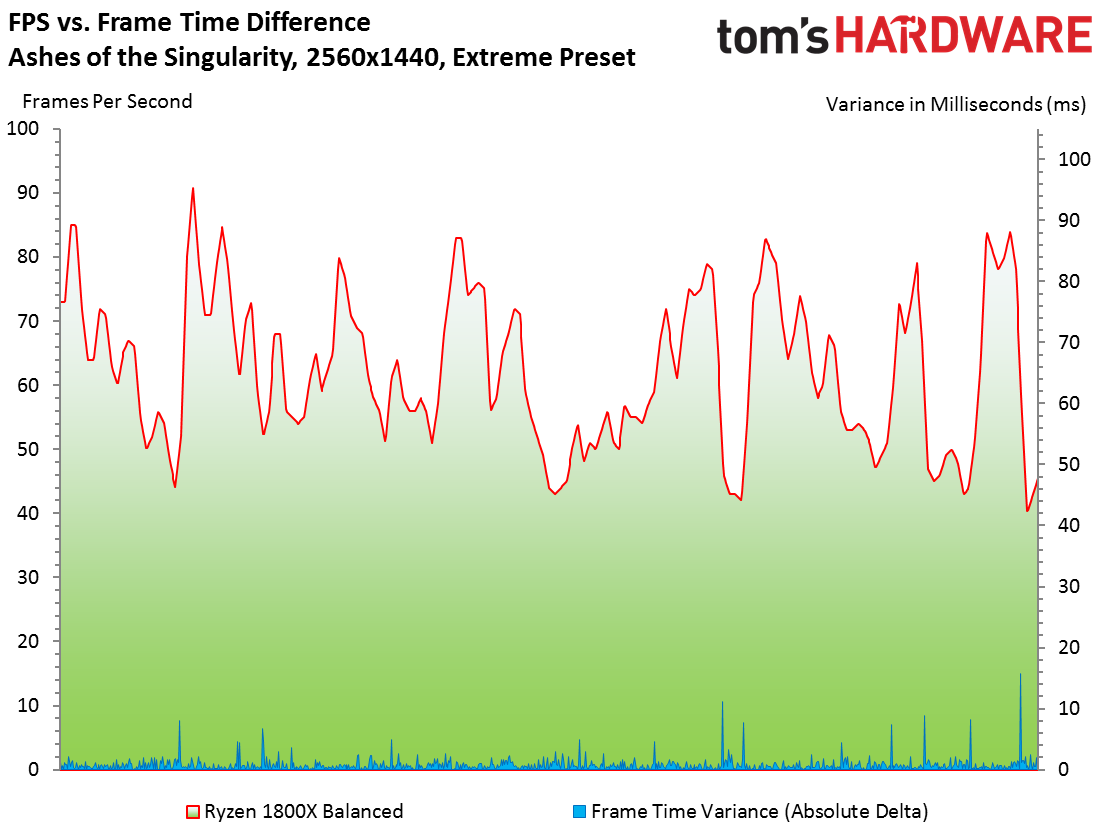
AMD provided its own benchmark numbers at 4K, creating a graphics-bound situation. We tested at 2560x1440 to reduce this bottleneck, exposing more difference between CPUs. The same strangeness happens at QHD too though, and 1800X trails the field by a quantifiable margin. The 1800X's behavior suggests the game isn't optimized for Zen at this point; Oxide Games released this statement:
“Oxide games is incredibly excited with what we are seeing from the Ryzen CPU. Using our Nitrous game engine, we are working to scale our existing and future game title performance to take full advantage of Ryzen and its eight-core, 16-thread architecture, and the results thus far are impressive. These optimizations are not yet available for Ryzen benchmarking. However, expect updates soon to enhance the performance of games like Ashes of the Singularity on Ryzen CPUs, as well as our future game releases.” - Brad Wardell, CEO Stardock and Oxide
Battlefield 4
We traipse into graphics-bound territory during our 1920x1080-based Battlefield 4 testing. Ryzen 7 1800X in its stock configuration (with the Balanced power profile) is the only modern processor that doesn't average 160 FPS or more. It fares better with the High Performance profile activated, pulling in with the rest of the field if you're willing to leave Windows in this mode.
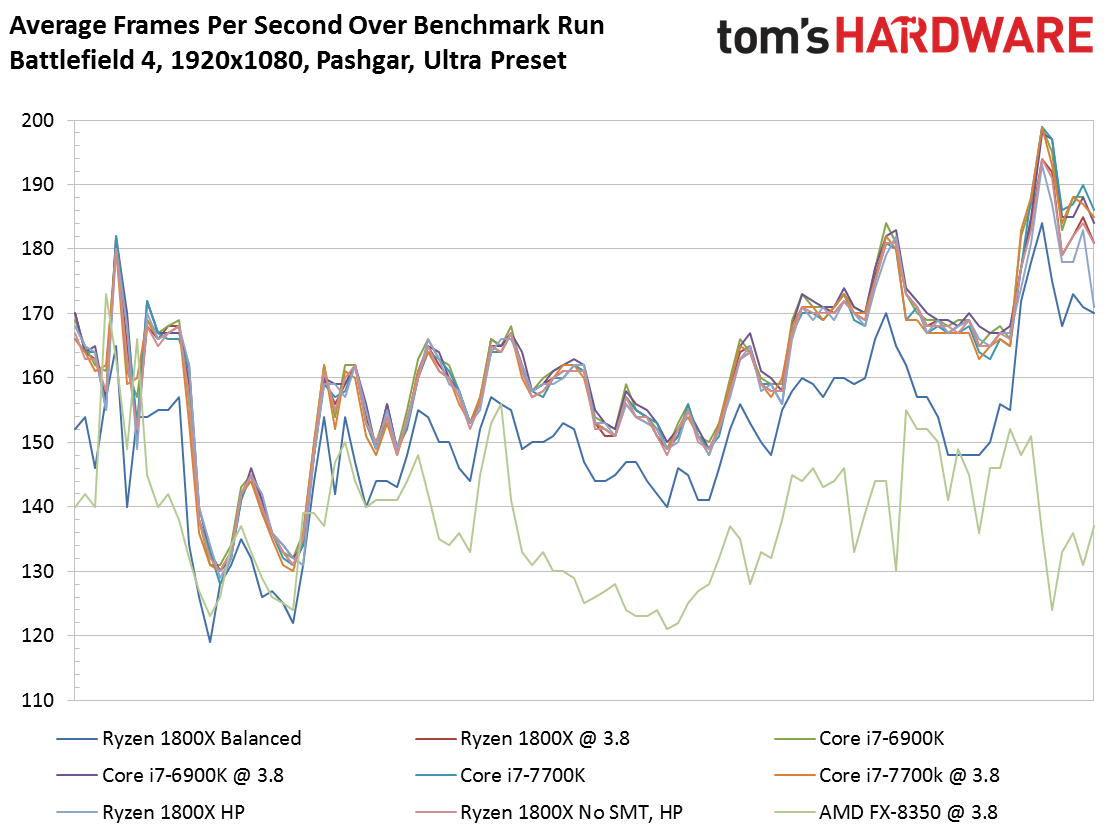
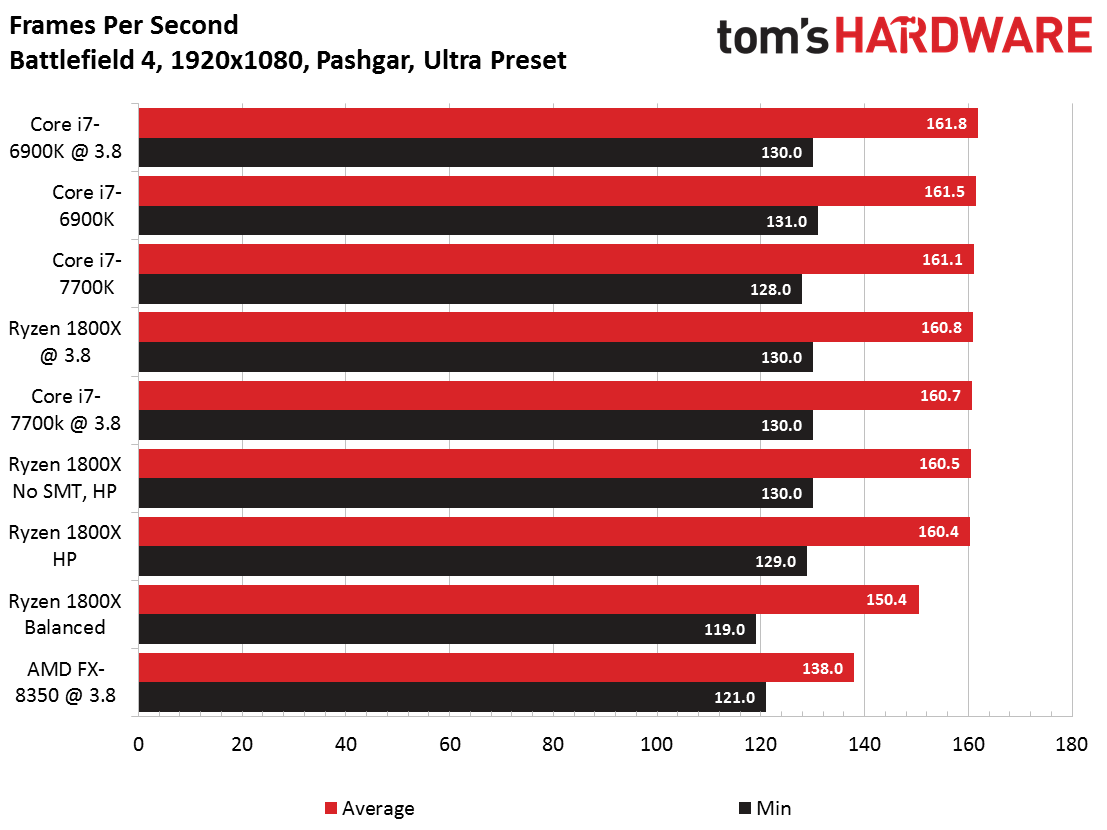
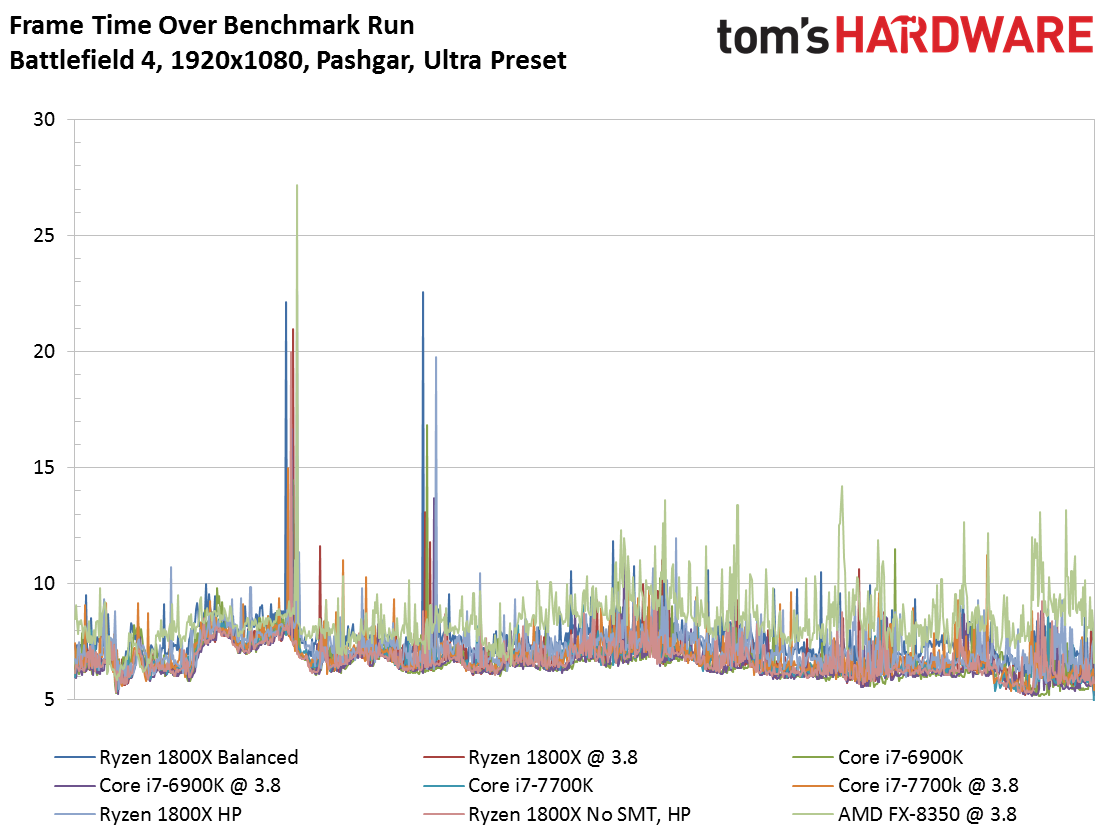
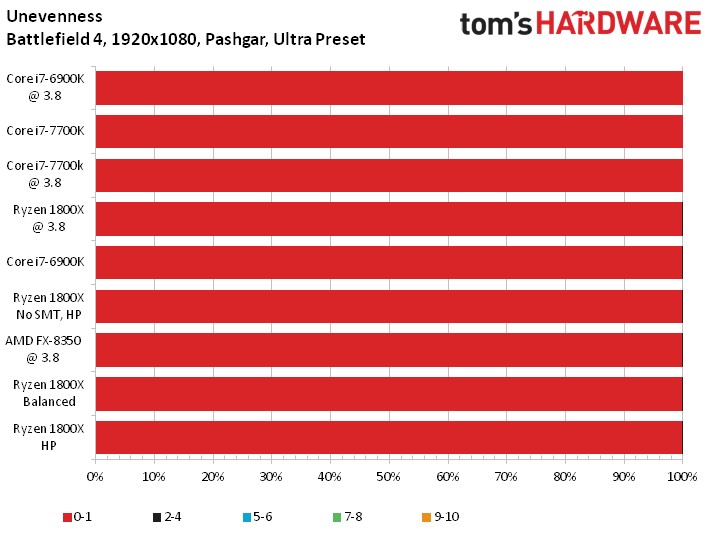
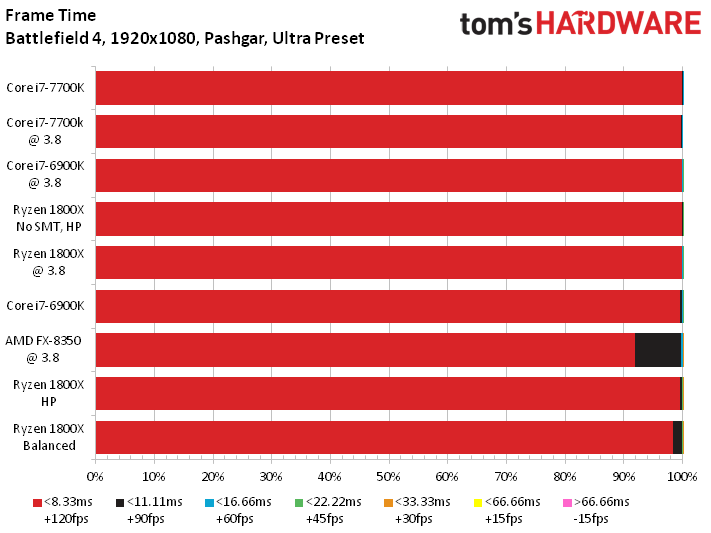
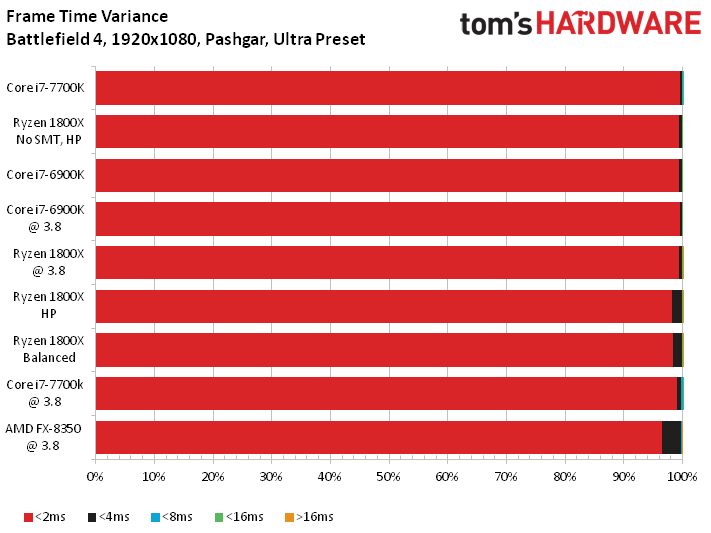
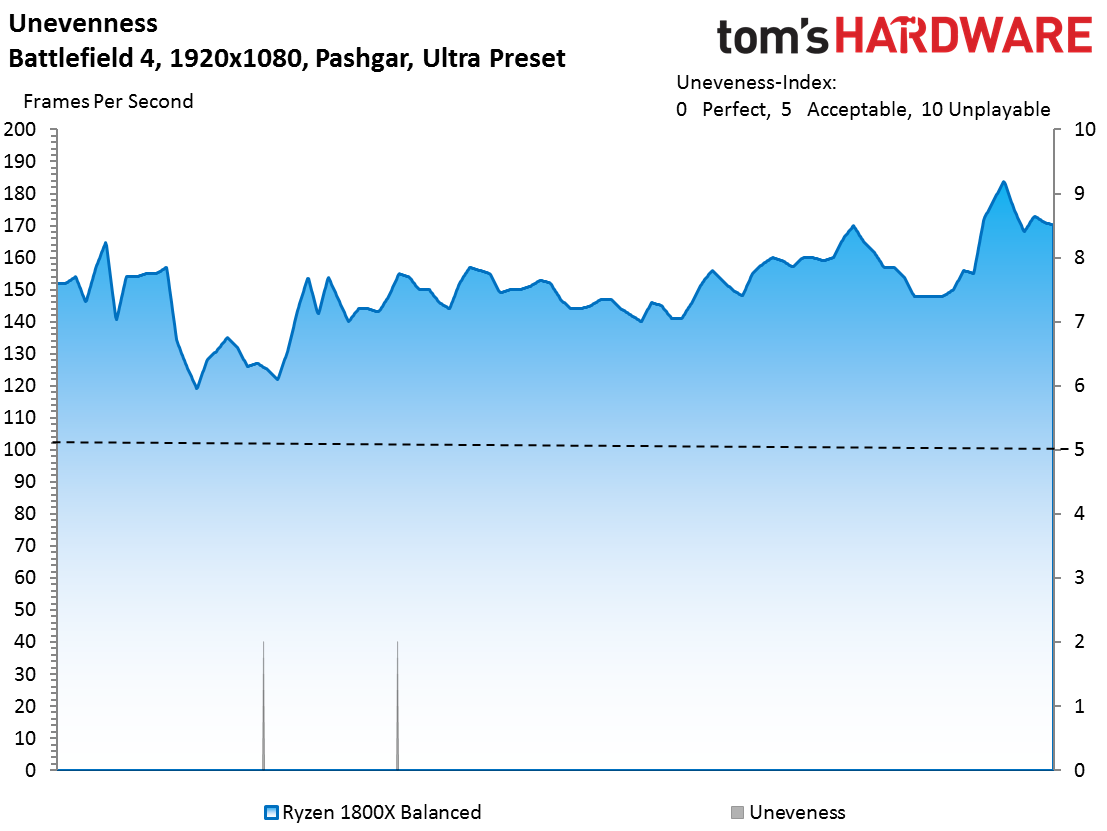
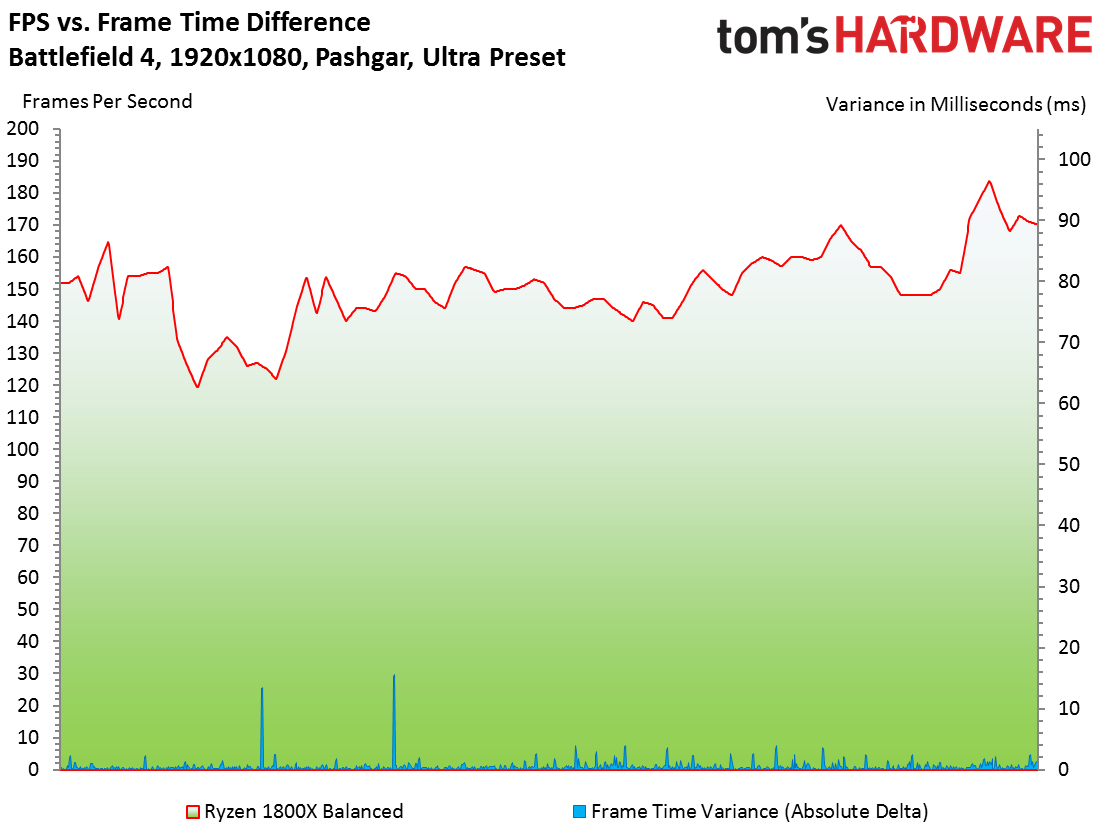
The FX-8350 trails at its 3.8 GHz setting, though that's a down-clock compared to its 4 GHz base frequency. The similarly-clocked Ryzen 7 1800X provides a notable speed-up compared to the old -8350.
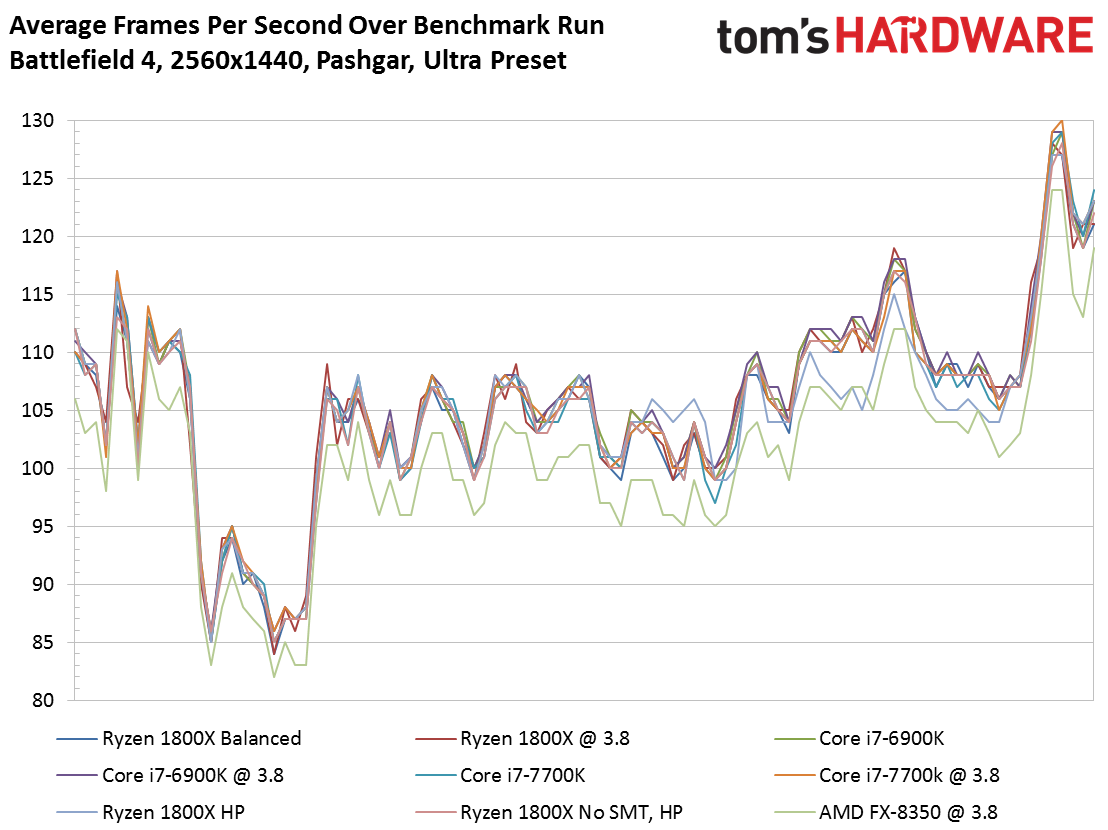
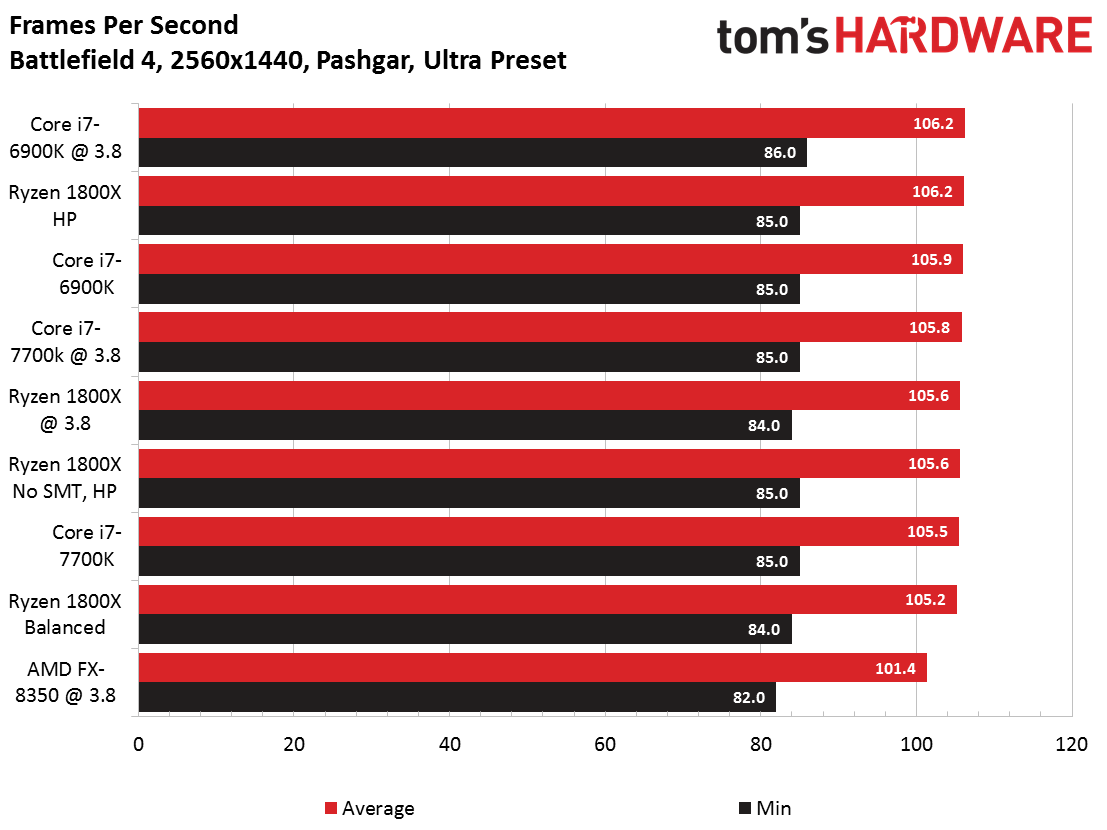
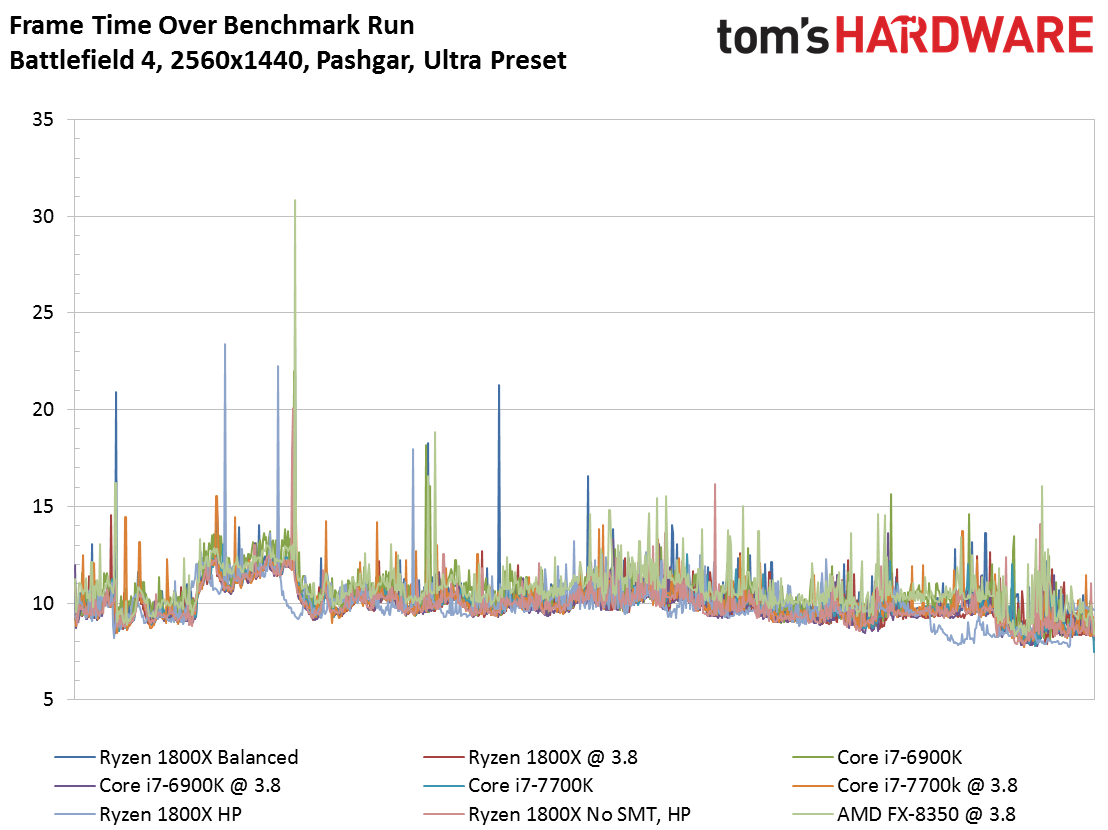
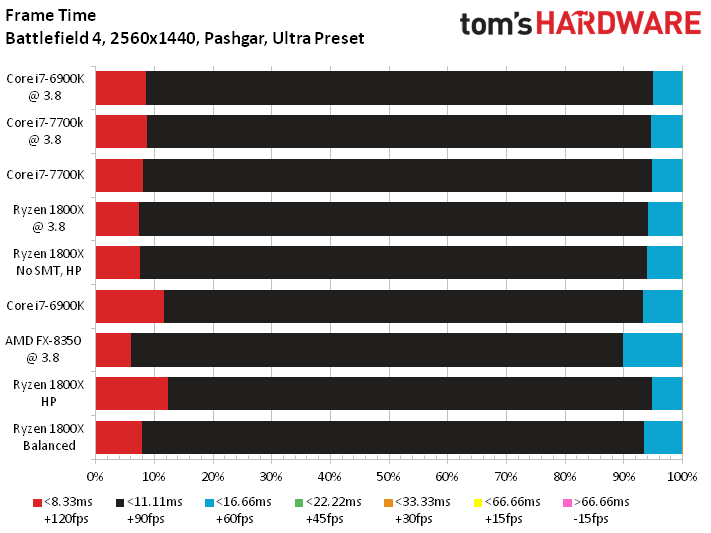
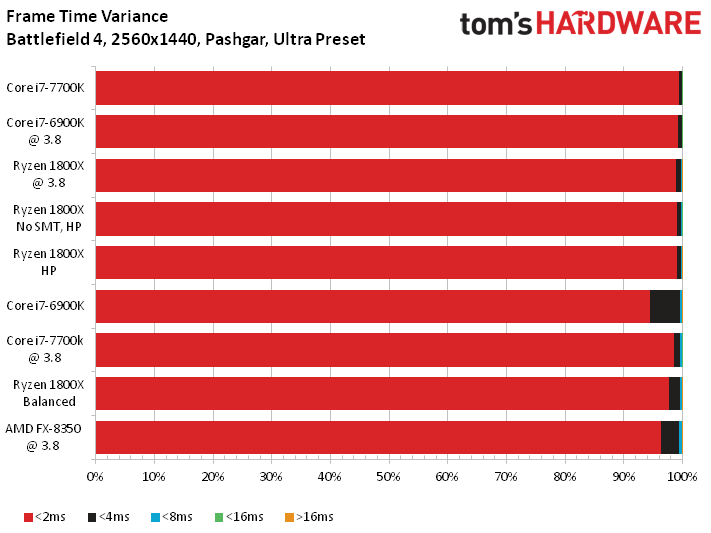
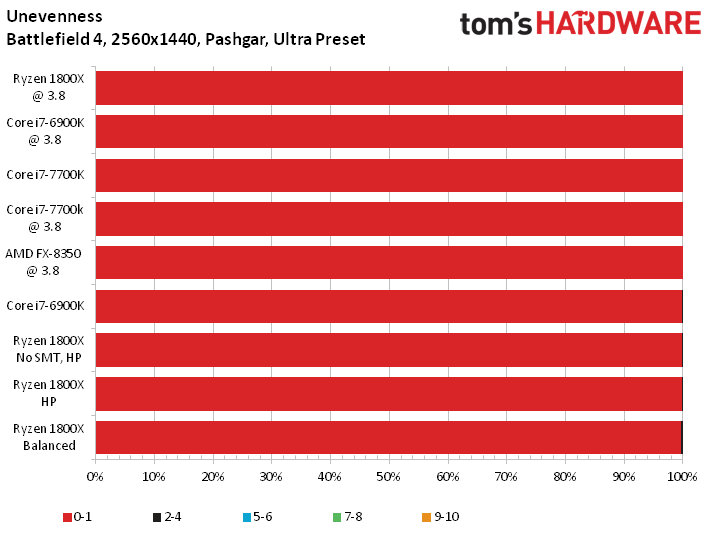
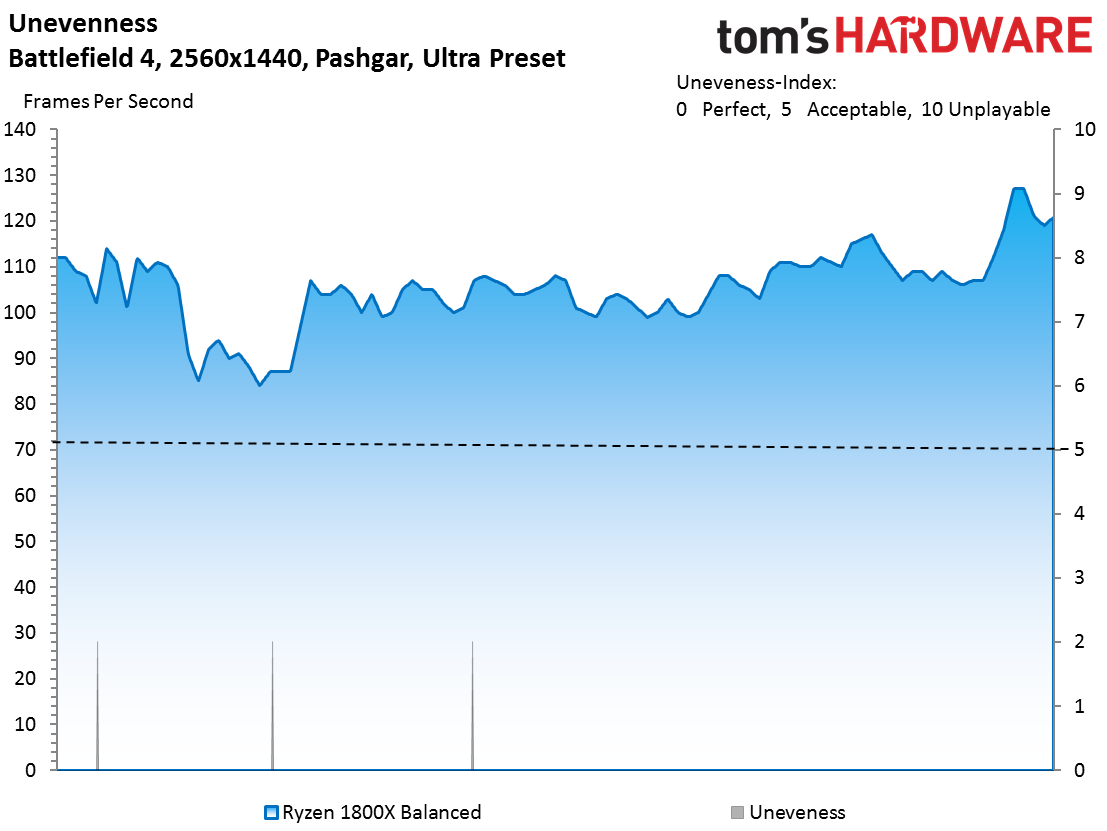
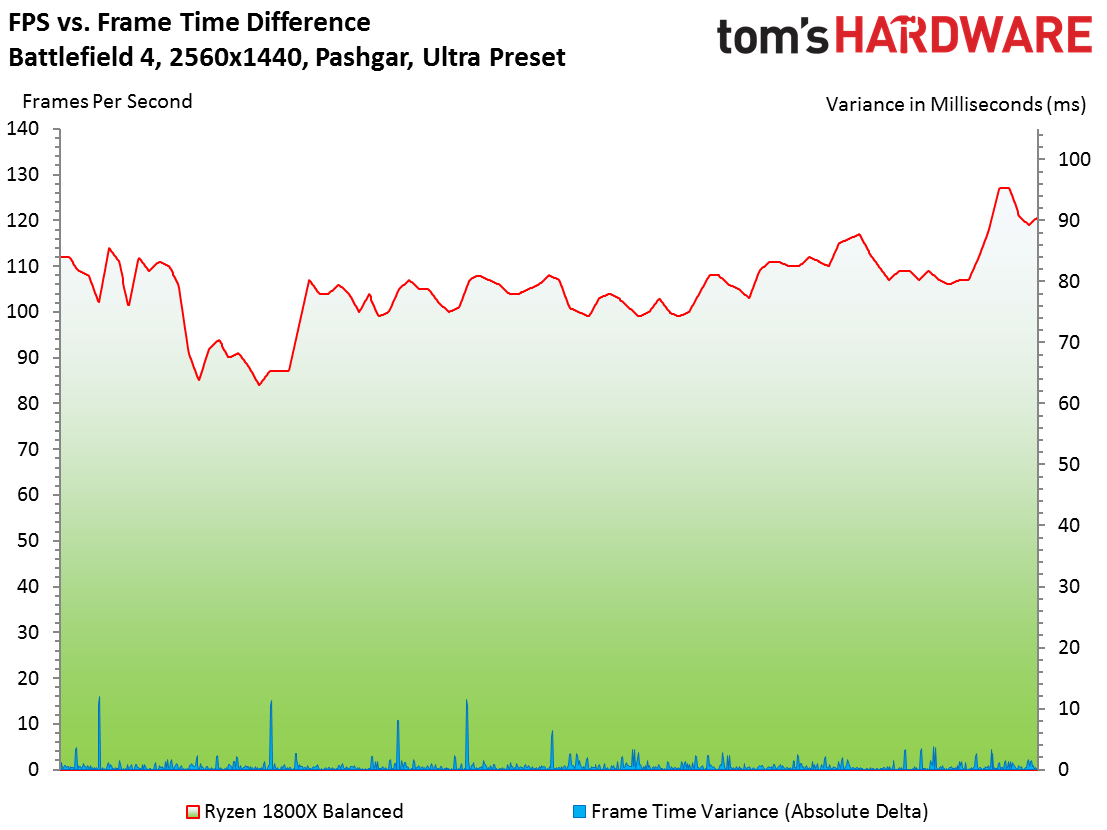
The Ryzen 7 1800X provides the same performance as Intel's Core i7-6900K, pushing the EVGA GeForce GTX 1080 FE into graphics-bound territory. If your favorite titles tend to be GPU-limited, you can save $500 on an eight-core processor that offers a lot of heft in more heavily-threaded applications (or save an additional $175 on a quad-core chip that games really well).
Current page: Ashes of the Singularity & Battlefield 4
Prev Page Cache Testing Next Page Hitman, Project CARS & Metro: Last Light
Paul Alcorn is the Editor-in-Chief for Tom's Hardware US. He also writes news and reviews on CPUs, storage, and enterprise hardware.
-
vrumor Well, at the very least, it is competition. Competition drives innovation and lower costs. Well done AMD.Reply -
kiniku Why did I feel AMD was hiding something? Understandably the "gamer market" is comparatively small. But couldn't AMD have designed a CPU that worked well in gaming/desktops and in data centers? Disappointing.Reply
(But I have a 5820K. The best Ryzen in the world would not have had me switch anyway.) -
xryanx123 Bias review as always. Most of your information is obviously screwed up. How do you get 4.0ghz at 1.45v. When that's not even an overclock for the chip (not really at least compared to stock) yet you're already pushing 1.45v? You're tailoring your articles for the uneducated. Duck off tomsReply -
captaincharisma in the end the best anyone can hope from AMD is that it spooked intel enough to lower its pricesReply -
ssdpro In a hurry to compare various site's gaming results, it appears differing sites are finding the same thing: gaming performance is acceptable but below 4c/8t Intel offerings. If you spend your day encoding or multi-thread benching this is a monster bargain.Reply
With the good and bad, I think we can all agree the good here is competition. There is some now. -
Pompompaihn All along AMD was claiming to equal/beat Broadwell-E in comparative tasks at half the price, and from another review that included Broadwell-E, it's done that. I don't recall ANY AMD press saying it was going to beat the 7700K in straight up gaming. So, target set, and hit. That's a win in my book. But now, need to see what they can do with the smaller core count chips and if they can scale frequency to be competitive in the gaming sector.Reply -
Dionisiatis Maybe i missed it but i would love to see a perf/dollar ratio comparison. Im sure Ryzen would occupy the top position, and it would also make it clear that AMD achieved extraordinary results in bringing such high performance to the average consumer that cant 700+ dollars for a CPU.Reply -
jackspeed @Dionisiatis the 7700K is cheaper then the 1800X so for gamers it currently is the best CPU. now games have yet to optimize for the new AMD architecture, so maybe soon it will be a different story.Reply -
Aspiring techie Your "Heating up AMD Ryzen" video on the Power and Temperatures tab is still private. I can't watch it.Reply -
Fails in gaming, and for multitasking stuff i got Xeon 14/28 who is doing all that encoding and other stuff for $300 on eBay.Reply
In my opinion AMD failed and they really pulled BS by fooling people into pre ordering but it turns out that in gaming sucks..